Lewis Hamilton's pit call stand-off in Mexico could haunt Mercedes
- Published
- comments
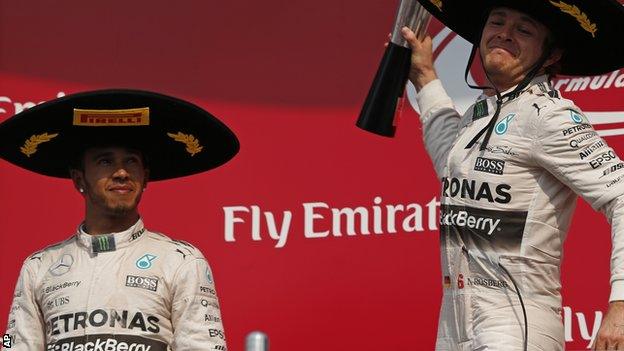
Hamilton finished second behind Rosberg for the third time in 2015
Lewis Hamilton's argument with his Mercedes team during the Mexican Grand Prix made it clear that claiming a third world title has changed nothing in his motivation and determination to continue winning.
Clinching the championship in Austin, Texas, a week ago meant Hamilton achieved a lifetime's ambition in matching the achievements of his childhood hero Ayrton Senna.
But, as with Senna himself, Hamilton's competitiveness and winning mentality have clearly been affected not at all by that success.
Having chased team-mate Nico Rosberg from the start, rarely more than two seconds behind, Hamilton sniffed an opportunity to win when the German was called in to change his tyres on lap 46 of the race at a raucously packed Autodromo Hermanos Rodriguez.
Now in the lead, Hamilton was told by engineer Peter Bonnington to pit on the next lap. Immediately, he questioned it. "Can I ask why?" he said.
The team were worried about tyre wear, he was told, before being ordered to "box this lap". Hamilton's mechanics were in the pit lane with his tyres, but he did not go in.
Bonnington came back on the radio. "So, Lewis, you WILL be boxing next lap," he said.
Again Hamilton argued. "You need to check his (Rosberg's) tyres," he said. "My tyres are all good."
"So, Lewis," Bonnington said, his voice calm but increasingly firm, "we were down to zero on the first set. If we run longer on this set we will be down to zero if not worse so box at the end of this lap - instruction."
"I think that's the wrong call," Hamilton replied, "but I'm coming in."
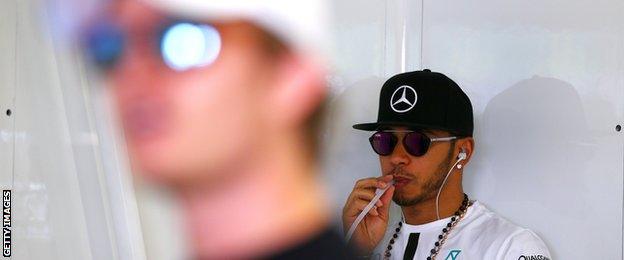
The world champion said he should have allowed to take the risk with his tyres and challenge Nico Rosberg for the lead
Hamilton's thinking was clear. He had been stuck all race. He felt he was faster, but the combination of low-grip track surface and disrupted aerodynamics meant he could not get close enough to Rosberg to try to pass him.
But now he suddenly had an 18-second advantage with 25 laps to go, on tyres that were almost certainly capable of going to the end of the race. And in those circumstances, he fancied his chances of winning.
The new tyres gave Rosberg about a second a lap in pace advantage. So, had the race run without a safety car - which it didn't, but at the time Hamilton was not to know that - he would probably have caught his team-mate before the end of the race.
But Hamilton will have been thinking that he had held Rosberg off before in circumstances like that, and he could do it again.
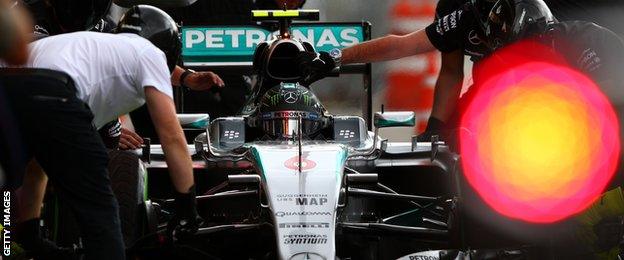
Nico Rosberg had frustrated his team-mate during practice when the Englishman claimed he 'backed him up'
"There was no risk," Hamilton said afterwards. "There was nothing for me to lose. We have won the constructors' championship, the team have won. So let me take a risk - let's go for it."
That is a racing driver thinking of himself, not the team. A racing driver talking with the confidence borne of comfortably beating Rosberg over the last two seasons, in which Hamilton has demonstrated both to his satisfaction and that of most observers that he is not only a slightly faster driver than the German but also far, far better at wheel-to-wheel racing.
His response to the team demonstrated his status, as their lead driver and as a man who has now achieved what only nine other drivers in history have done.
And it demonstrated that, third title or not, he wants nothing more than to keep on winning, and grind Rosberg into the dust.
Why Mercedes made the call
Hamilton's willingness to debate with Bonnington also demonstrated a maturity and desire to take more of an involvement in his races from his car.
Earlier in his career, this was missing, and it underlines his growth as a driver and as a sportsman. It is one of several 'added value' talents that mark out great drivers from merely very good ones.
But it clashed with the team's job, which is first and foremost to finish one-two. For them, there was no benefit to not stopping for fresh tyres when they did, only potential downsides.
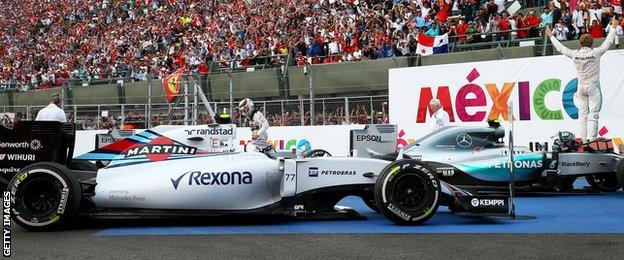
Once Rosberg had sprinted clear after the safety car, victory was his to throw away
Rosberg and Hamilton had absolutely dominated the race, and by lap 46 they had built enough of an advantage over the rest of the field to be able to stop for fresh tyres without losing the lead.
In such circumstances, it is standard practice to do just that because there is nothing to lose. Engineers call it "protecting against a safety car" - reducing the risk of losing places if one is deployed in the event of an accident.
And six laps after Rosberg's stop - four after Hamilton's - there was indeed a safety car, when an unusually off-form Sebastian Vettel finally did what he had been threatening to do all race and smashed his Ferrari into the barriers.
If Mercedes had not stopped either driver when they did, it was Hamilton who would have been at risk when the safety car came out. The two cars would have been "stacked" in the pits - stopped at the same time - and Hamilton would have lost time, and potentially positions.
As for the claim that there was a safety issue, that was a reference to the fact that, as was demonstrated by the failures at the Belgian Grand Prix in August, when the tyres wear down there is an increased risk of a puncture.
Not stopping would have meant Hamilton doing 43 laps on that set of tyres. Well within the predicted wear life - but then so were Vettel's when he suffered a 200mph blow-out at Spa in August. The Mercedes engineers did not want to take that risk.
As team boss Toto Wolff said: "We had the option tyre down to the canvas (after the first stint), we had the margin for a safety stop and Lewis's tyres were more marginal than Nico's so we decided to do those.
"It was not about tread left then, it was about the end of the race and we would not have risked a team result."
Following the decision to stop, Mercedes were sitting pretty. With fresh tyres, they had no need to stop when the safety car was deployed, and once it pulled off, Hamilton had 13 laps to have a go at his team-mate. As before, he could do nothing about him.
Why Hamilton might be privately annoyed
Hamilton dodged the issue after the race, but privately he might well be thinking that he was right to think he should have stayed out.
He had an 18-second lead after Rosberg's stop. The fresh tyres gave both drivers about a second a lap so Rosberg would nowhere near have caught Hamilton by the time the safety car was deployed on lap 52. At which point Hamilton could have come in for his fresh tyres and might have come out still in the lead - which he would almost certainly have kept to the end of the race.
More from BBC F1 |
|---|
For the latest news and analysis, follow @bbcf1, external on Twitter |
If he was thinking that, though, he did not say it. Indeed, in his post-race interviews he did not seem to have considered it - referring only to the fact that "the tyres would have got cool and Nico would have been right on my tail on fresh tyres".
That suggests he was only considering not stopping at all, which almost certainly was the wrong decision - on fresh tyres with Hamilton on worn ones, Rosberg's chances of passing his team-mate would have been high.
"We'll have a chat when we get back and I have full confidence in those guys," Hamilton added.
Will it come back to haunt Mercedes?
Not for the first time with Mercedes over the last two seasons, the events demonstrated the inherent tension in the relationship between a driver and his team, especially when that team is dominant and the two drivers are each other's only real rival.
Mercedes' actions in Mexico were the latest in a series of examples of the team trying to be fair to both drivers while staying as much in control as possible.
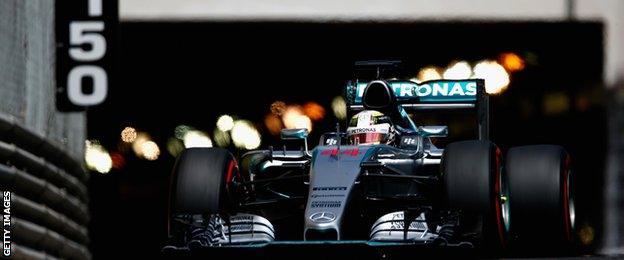
At Monaco this year, Rosberg took victory with Hamilton third after an unnecessary pit stop under the safety car
It was a strategy that got them into problems during last season, but which has not done so this year because Hamilton has generally been so superior and the championship has not been close.
In different circumstances, though, it is the sort of decision that could cause Mercedes difficulties - and indeed has done already.
An example would be last year's Hungarian Grand Prix, when the two drivers were on different strategies and Hamilton was ordered to let Rosberg by.
That call was predicated on their pre-season agreement that each driver would be given the best chance to make his own strategy work if they were on differing ones.
But Hamilton knew that if he let Rosberg by, he would almost certainly be beaten by him - and having got himself into a position to compete for victory after starting from the back as a result of an engine fire in qualifying, and having already lost many points to reliability problems, he was not prepared to do that. And he refused.
Rosberg was infuriated. But the team backed Hamilton, Wolff saying the team had made the wrong call. As a result of that, Mercedes took a different approach to race strategies from then on last year.
But it was the grudge Rosberg bore after that decision that directly led to the collision he precipitated at the next race in Belgium. And the fall-out from that - a public and private dressing-down for Rosberg - completely changed the dynamic of both Mercedes internally and the season itself in Hamilton's favour.
Mexico was not a dissimilar situation. A driver thinking of himself rather than the team. A miscommunication or apparent mistrust between him and his engineer. A potential victory denied.
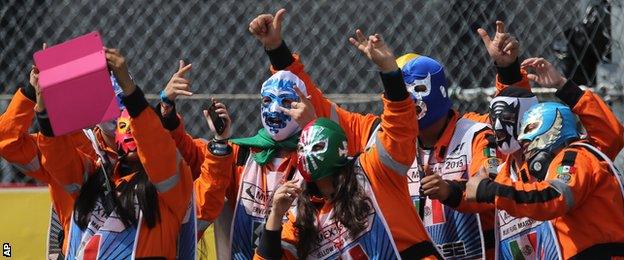
Hamilton described the atmosphere in Mexico as like being at a football match
"It was clear he was questioning it because he saw an advantage," team boss Toto Wolff said. "If he didn't do that he wouldn't be a racing driver. Finally it is clear the team knows what is happening out there on track and everything is cool."
For how long, though? With both titles already won, and relatively little at stake, it is likely this will blow over this time.
But unless Wolff and co-team boss Paddy Lowe are not careful about how they handle the fall-out from Sunday's events with Hamilton, it's not impossible that at some point in the future what happened in Mexico might come back to haunt Mercedes.
- Published2 November 2015
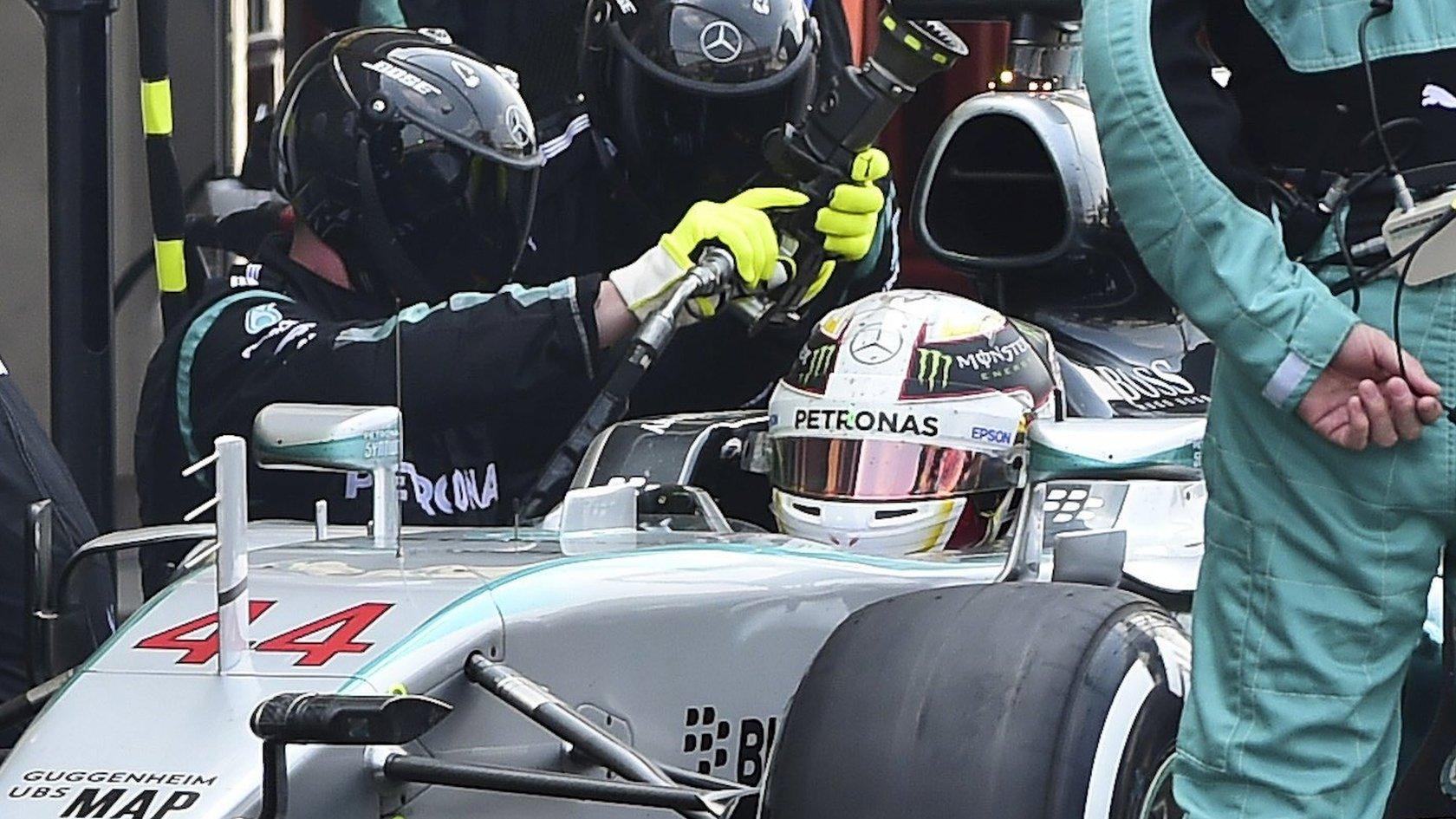
- Published1 November 2015
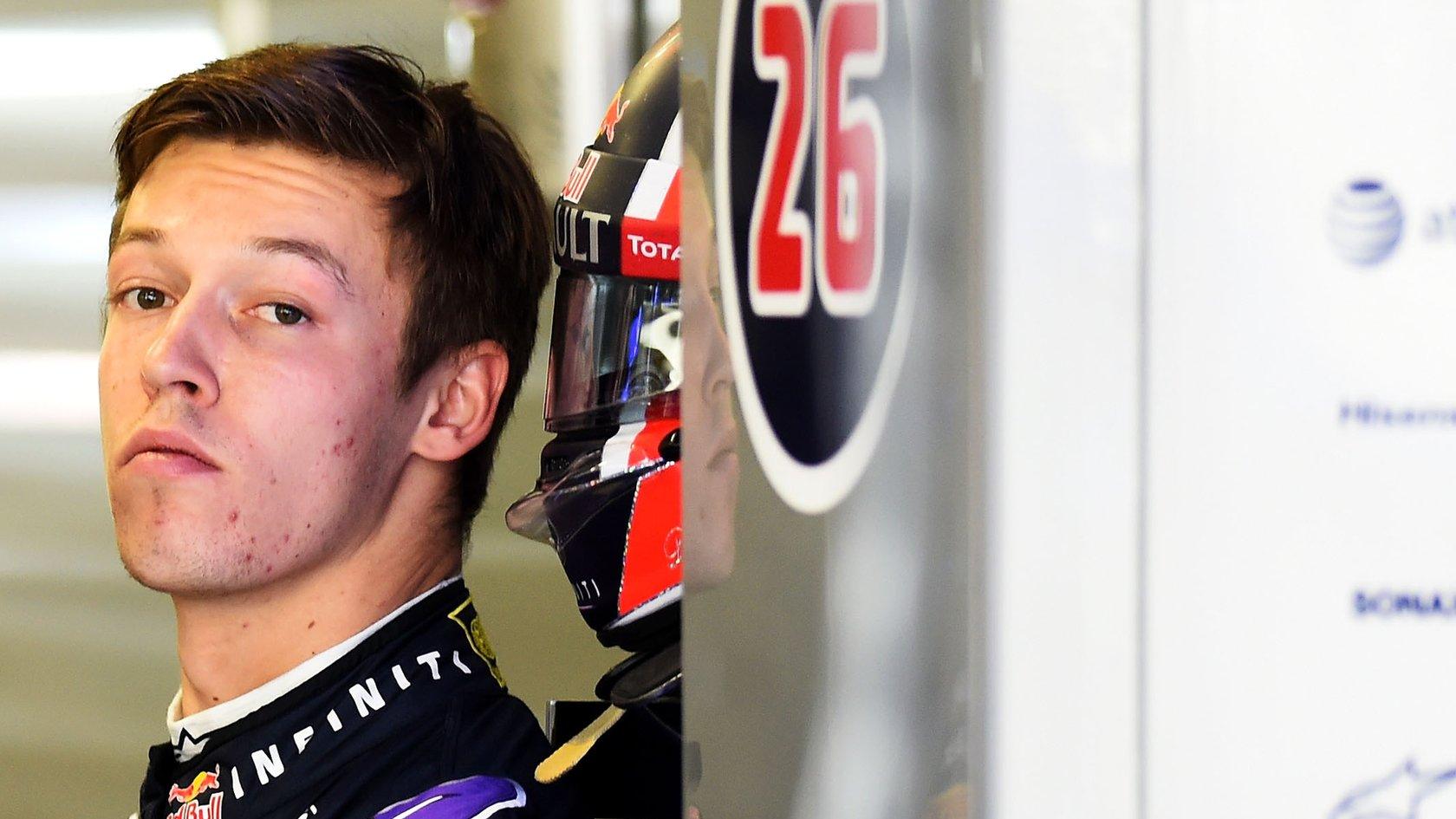
- Published1 November 2015

- Published1 November 2015
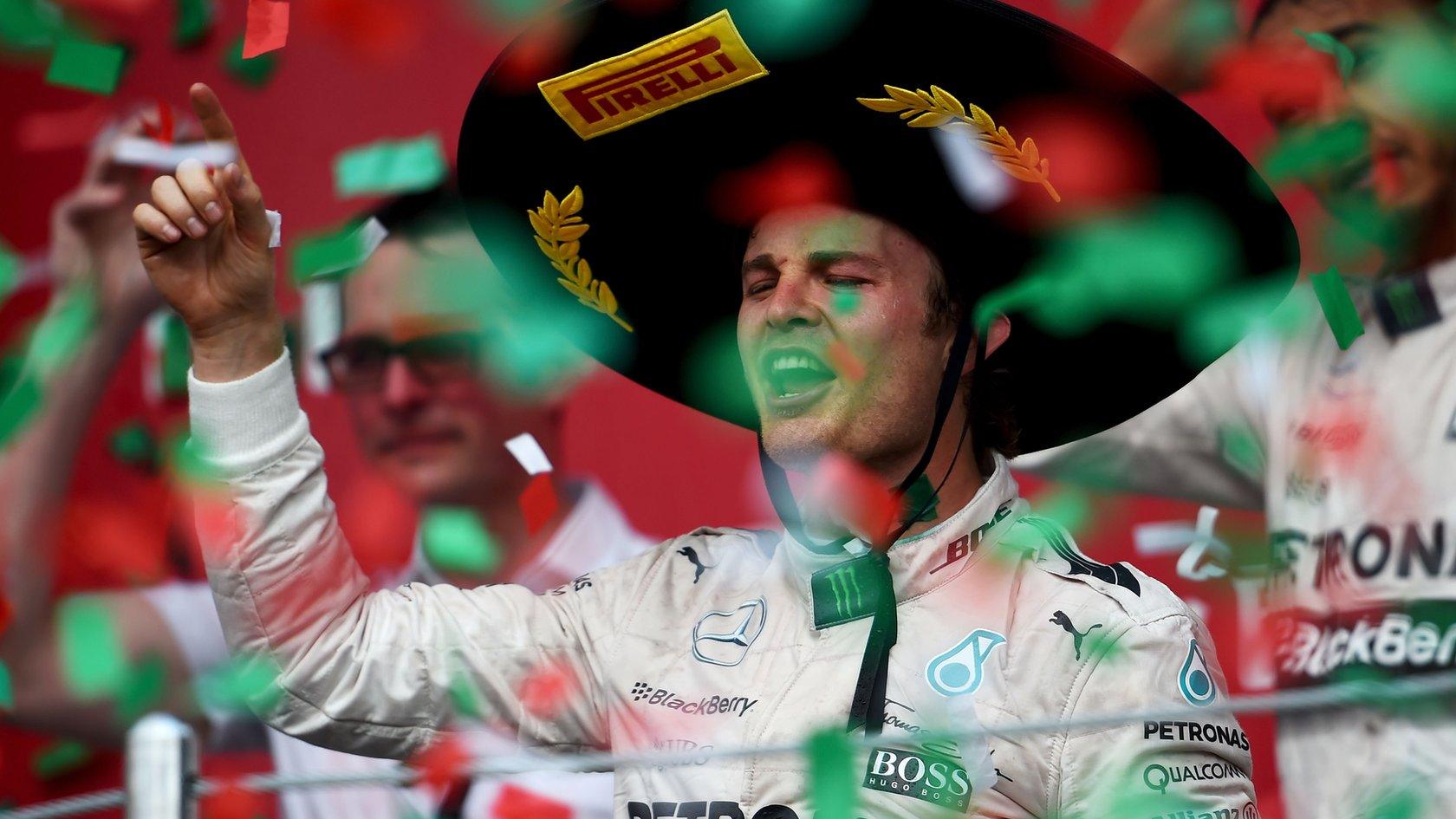
- Published1 November 2015
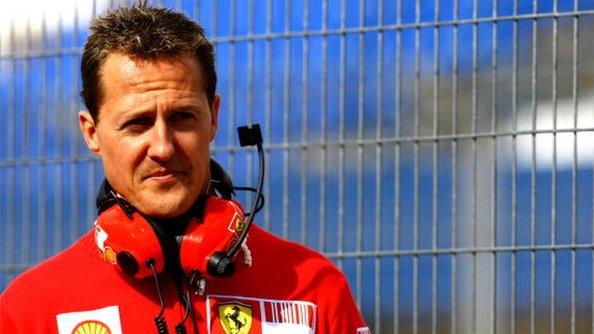
- Published29 October 2015

- Published18 December 2015

- Published2 November 2018

- Published26 February 2019
